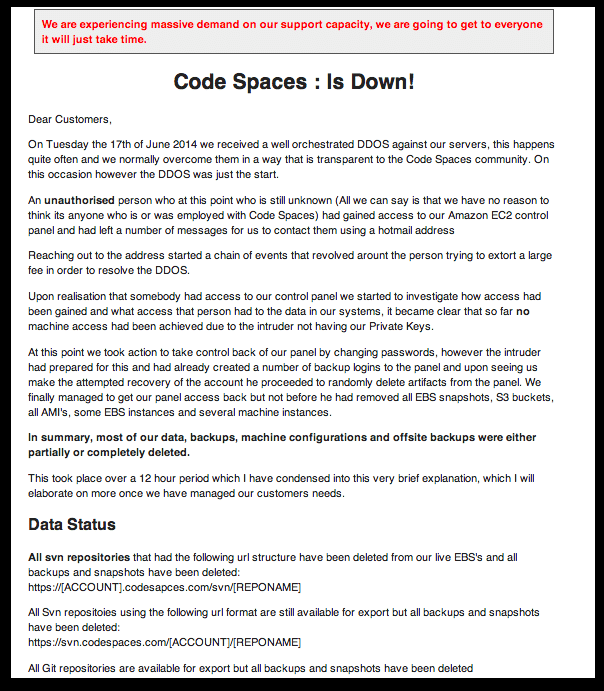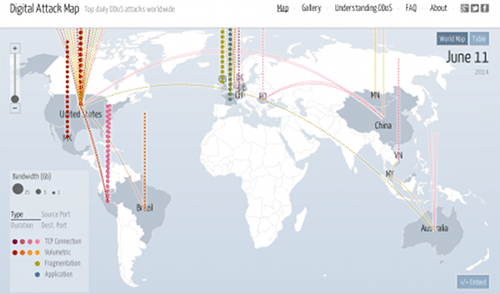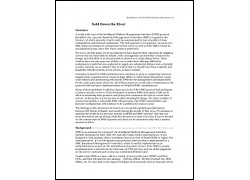The spectacular collapse this week of Code Spaces, a cloud-based code repository, may have been the result of a an unspectacular “opportunistic” hack, rather than a targeted operation, according to one cloud security expert. The sudden demise of the online application repository has sent shock waves through the tech industry, laying bare what some say are lax practices among many cloud-based application and infrastructure providers. But the attack itself was almost certainly the result of a larger, indiscriminate cyber criminal campaign, said Jeff Schilling, the Chief Security Officer of Firehost, a Texas-based secure cloud provider. “This is something we pretty frequently: companies get held ransom with a DDoS attack, and if that doesn’t work, (the attackers) will resort to doing other things,” Schilling told The Security Ledger. But Code Spaces almost certainly wasn’t the only company the extortionists worked on, Schilling said. Instead, the company was likely caught up in a wide net […]
hosting
DDoS Attacks Hit Cloud Apps Evernote, Feedly
Large-scale attacks knocked two prominent, web-based services offline late Tuesday, as cyber criminals attempted extort money from the owners of news aggregation site Feedly and the hosted productivity tool Evernote. Feedly – a web site that pulls together news feeds from across the web – remained unreachable early Wednesday, while Evernote was back online. Both companies issued statements confirming that they were the victims of a massive distributed denial of service (DDoS) attack. “We’re actively working to neutralize a denial of service attack. You may experience problems accessing your Evernote while we resolve this,” read a message sent from Evernote’s Twitter account Tuesday evening at around 8:00 PM Eastern Time. And, around 5:00 AM Eastern on Wednesday, Feedly posted a blog entry that reads: “Criminals are attacking feedly (sp) with a distributed denial of service attack (DDoS). The attacker is trying to extort us money to make it stop. We refused to give […]
IPMI Insecurity Affects 200k Systems
It has been almost a year since security researcher Dan Farmer first warned of the danger posed by Intelligent Platform Management Interface (IPMI) – a ubiquitous protocol used to do remote management of servers. According to a new report, however, that warning went unheeded. Writing last week (PDF), Farmer said that a world-wide scan for systems using the Intelligent Platform Management Interface (IPMI) protocol identified over 230,000 Baseboard Management Controllers (BMCs) exposed to the Internet. As many as 90% of the exposed systems could be compromised by exploiting what Farmer characterized as “basic configuration and protocol weaknesses.” Even more worrying, the 230,000 systems that are Internet accessible are probably just a fraction of all the vulnerable systems that might be attacked, with many deployed on (hackable) corporate and private networks. Farmer is reiterating calls for public and private sector organizations to wake up to the dangers posed by IPMI. Hackers who are able to compromise Baseboard Management […]
Big GOV Shift To Secure Cloud?
For those of us covering the cyber security beat, there haven’t been many feel-good stories coming out of the federal government in – well – forever. Even before the advent of nation state sponsored hacking, the news was mostly of the federal government’s bloated and unwieldy IT infrastructure, byzantine procurement systems and the difficulty of attracting top talent away from private sector employers who could offer more pay, more autonomy and a better working environment. Then came the gut wrenching display of offensive prowess by the U.S.’s main enemies – nations like China, Russia and Iran. Those stories started, in earnest, with news about operations like Titan Rain (in 2003) and continue to the present day. The problem has gotten so bad that the military’s preferred euphemism for Chinese hackers – “advanced persistent threat,” or “APT” has become part of the nomenclature of the IT security world far beyond […]
Cisco Survey: 100% of Fortune 500 Hosting Malware?
If you’re working in IT at a Fortune 500 firm, Cisco Systems has some unwelcome news: you have a malware problem. According to the 2013 Annual Security Report from the networking giant, 100 percent of 30 Fortune 500 firms it surveyed sent traffic to Web sites that host malware. Ninety-six percent of those networks communicated with hijacked servers operated by cyber criminals or other malicious actors and 92 percent transmitted traffic to Web pages without content, which typically host malicious activity. “It was surprising that it was 100 percent, but we know that it’s not if you’re going to be compromised, but when,” said Levi Gundert, a technical lead in Cisco’s Threat Research, Analysis and Communications (TRAC) group in an interview with The Security Ledger. Among the high points (or low points) in Cisco’s Report: Cisco observed the highest number of vulnerabilities and threats on its Intellishield alert service in the 13 years […]




